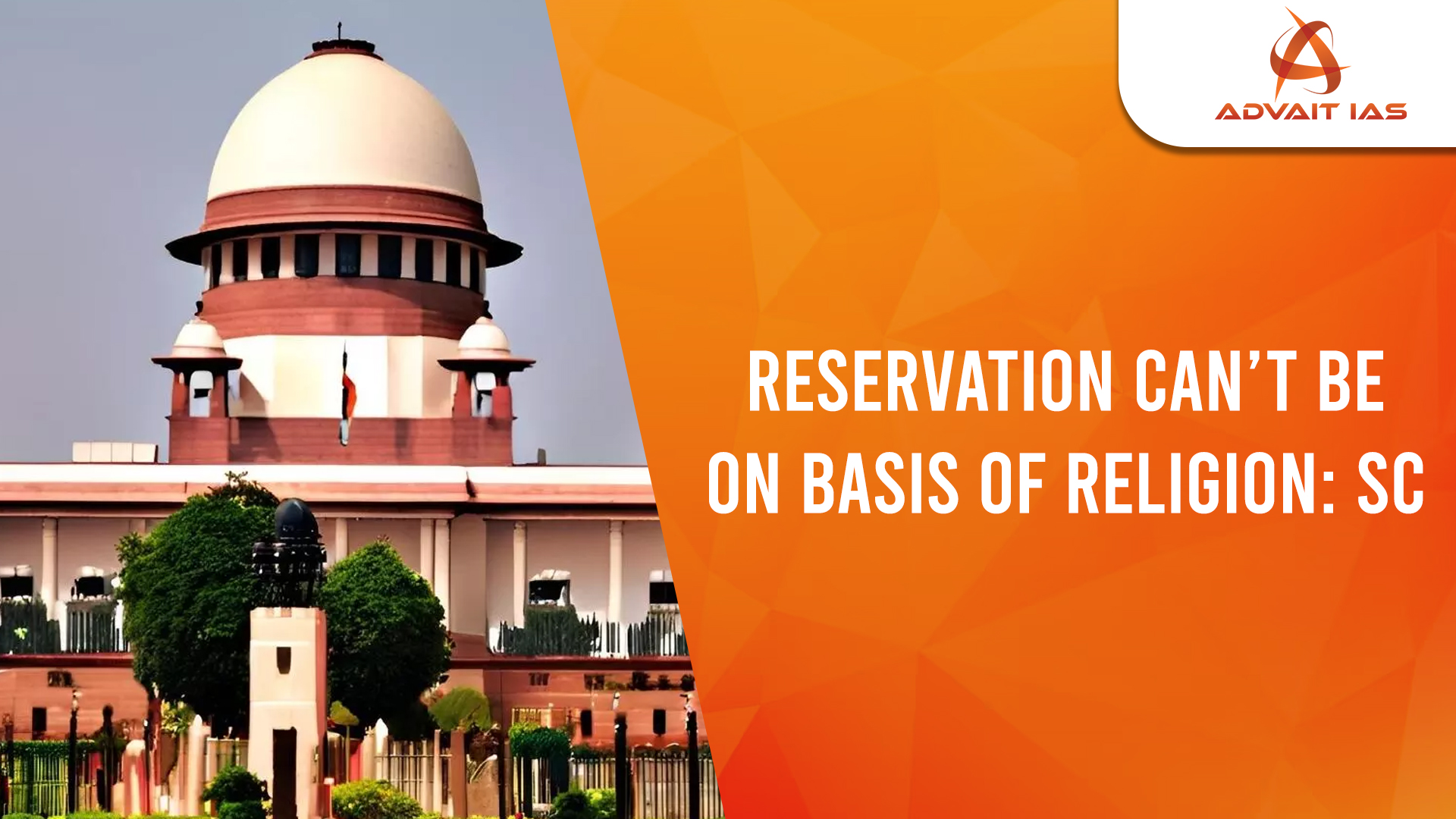“Reservation can’t be given on the basis of religion”, orally remarked the Supreme Court on Monday (December 9) while hearing the petition filed by the State of West Bengal challenging the decision of the Calcutta High Court to quash the Other Backward Class (OBC) classification of 77 communities, mostly belonging to Muslim religion.
Reservation system
- The reservation system in India originated from the caste system to address historical injustices faced by marginalized communities.
- It provides quotas in government jobs, education, and legislatures as affirmative action, governed by constitutional provisions and government policies.
Constitutional Provisions Governing Reservation in India
- Part XVI: Deals with the reservation for SCs and STs in Central and State legislatures.
- Article 15(4) & 16(4): Allows the State and Central Governments to reserve seats in government services for SCs and STs.
- Article 16(4A): Inserted by the 77th Amendment (1995) to enable reservation in promotions for SCs and STs.
- Article 16(4A) Modification: Amended by the 85th Amendment (2001) to provide consequential seniority to SCs and STs in promotions.
- Article 16(4B): Added by the 81st Amendment (2000), allows filling unfilled SC/ST vacancies in subsequent years, bypassing the 50% reservation cap.
- Article 330 & 332: Reserves seats for SCs and STs in Parliament and State Legislative Assemblies.
- Article 243D: Provides for reservation in Panchayat elections.
- Article 243T: Ensures reservation in Municipality elections.
- Article 335: Stipulates that the claims of SCs and STs must align with maintaining administrative efficiency.
- 103rd Amendment Act, 2019: Provides 10% reservation for Economically Weaker Sections (EWS) in education and public jobs, excluding SCs, STs, and OBCs.
- 105th Amendment Act, 2021: Restores state power to identify Socially and Educationally Backward Classes (SEBCs), overturning a Supreme Court judgment.
- 106th Amendment Act, 2023: Women’s Reservation Act reserves one-third of seats in the Lok Sabha and State Assemblies, including SC/ST seats, for 15 years, pending the next Census and delimitation.
Key Highlights of the Verdict:
- Constitutional Basis:
- Reservations are rooted in Articles 15(4) and 16(4) of the Indian Constitution to address social and educational backwardness.
- The focus must remain on objective criteria such as caste, class, and backwardness—not religion.
- Secular Structure:
- India follows a secular framework where the State does not privilege or discriminate against any religion.
- Religion-based reservations could breach this principle and lead to communal tensions.
- Previous Instances:
- Indra Sawhney Judgment (1992): The SC held that reservation must be tied to identifiable backwardness, not religion alone.
- Similar decisions have invalidated attempts to offer reservation for entire religious communities without specific evidence of backwardness.
- Inclusivity Without Exclusivity:
- Backward individuals from all communities, including religious minorities, can benefit from existing provisions if criteria like social and educational backwardness are met.
Implications:
- Reinforces that backwardness must be assessed beyond religion to ensure justice and inclusivity.
- States cannot enact policies that bypass constitutional parameters.
- Promotes unity by ensuring fair and transparent reservation policies.
Why Reservation is Necessary?
- Addresses historical injustices endured by marginalized castes.
- Provides equitable opportunities for underprivileged sections lacking access to essential resources.
- Ensures adequate representation of disadvantaged classes in public services and institutions.
- Facilitates the socio-economic development of historically backward communities.
- Promotes equality by mitigating systemic disparities, laying the foundation for true meritocracy.
Arguments Against Reservation
- Creates divisions and hostility among employees, disrupting workplace cohesion.
- Reinforces caste identities instead of dismantling them, counteracting its intended purpose.
- Despite economic growth, socially disadvantaged groups often remain marginalized.
- Impacts self-esteem by encouraging individuals to focus on proving backwardness over merit.
- Erodes meritocracy, which is critical for societal advancement.
- Politicized to garner support by exploiting caste and class loyalties.
- Benefits are often cornered by dominant subgroups within backward classes, excluding the neediest.
The SC’s ruling upholds the spirit of equality, fairness, and secularism in India’s reservation framework. By mandating that reservations focus on backwardness rather than religion, the decision strengthens the Constitution’s vision of inclusive growth while guarding against divisive policies.






